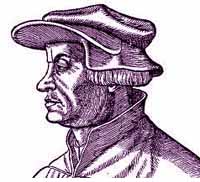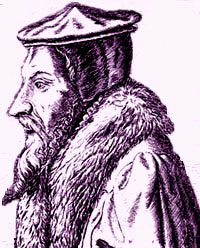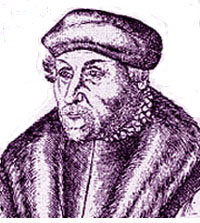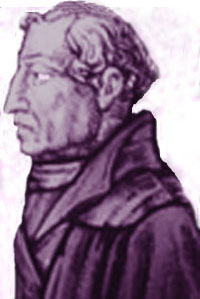 |
Faith under Attack
Notorious Vices of the Pseudo-Reformers
Fr. Leonel Franca, S.J.
The moral profile of other so-called reformers is no more edifying than the ones we looked at in the previous articles (here and here).
I will speak more about Henry VIII, the man of six wives, later. For now I only quote this testimony of the English Protestant Fitz William: “Out of respect for my country’s ministers, I would prefer to be silent about the insignificant cause that produced that enormous event [England’s separation from Rome], but since it is well-known, to be silent would show partiality. The cause was the illicit passion of Henry VIII for Anne Boleyn. If passion had not influenced the disposition of this monarch, he would have maintained his amiable relations with the Holy See. Until his death he would have held the title of Defender of the Faith he had acquired, and his successors could use it without making a mockery, as it does today, of the one who granted it, the Pope, as well as of the gift itself, since the English monarch rejected the Faith he once defended.
"But it is always by taking the path of vice that one travels from the Church to a sect, just as it is always by choosing the road of virtue that he returns to the Church.” (1)




From the top, Zwingli, Beza, Carlstadt & Bucer |
Zwingli, a Swiss parish priest, was expelled from his parish because of his dissolute customs. Before he did away with dogma, he had already disregarded the Decalogue. He became a “reformer” and married, even though he was a priest. But shortly his wife had to put up with the other women with whom he had affairs. His scandals were public knowledge, and more than once he openly admitted them.
In 1522, when his brethren, concerned about the rumors they heard, asked for an explanation, he answered them: “If someone tells you that I sin by pride, intemperance and lust, believe them without difficulty. Sadly I am subject to these and still other vices.” (2) In a plea to the Bishop of Constance to suppress priestly celibacy, he wrote: “We burn for chastity! All the more so because we bear so much immorality.” (3)
Theodore Beza, a disciple of Calvin, was known also for his libertine spirit and licentious poetry. He lived with a woman named Claudia, already married to a Parisian tailor who was still living. This unhappy woman had to bear with a large number of competitors who frequented Beza’s house. One day someone exhorted him to convert to Catholicism, and the old heretic shamefully lowered his head and pointed to the room where his concubine was.
The German reformer Andreas Carlstadt, the Swiss reformer Johannes Ecolampadio and Calvin’s colleague Martin Bucer were all priests who rejected their vows and applauded the Pseudo-Reform that opened the door of marriage to them. The first concern of these “new evangelists” was to find a wife.
Such action was contagious. Other priest and friar apostates followed their example and married, but they could not restrain themselves to the normal morals of an honest man. Indeed, how could those who denied the faith and broke their religious vows sworn to God be faithful to a word given to their wives?
Polygamy began to spread among the new evangelists. The “parish priest” Michael Kramer had three wives. Sebastian Flash, a Lutheran preacher, described the exchange of wives frequent among the Protestants. Referring to another preacher of a higher rank, he affirmed: “He wanted to make a contract with me for a wife exchange, and when he saw I was not interested, he tried to oblige me by physical force. The sense of modesty prohibits me from entering into further details.” (4)
Cross-accusations reveal their characters
No one revealed the bad customs and moral character of these first pseudo-reformers with more violence and cruel realism than their own leaders. In their internal quarrels, present from the beginning among Protestants, they publicly exposed their domestic miseries. Masters and disciples threw the most intemperate accusations at each other.
First let us hear what the heresiarchs Luther and Calvin had to say about their fellow ‘reformers’:
Luther, referring to Carlstadt, wrote that he is “a domestic devil and a traitor.” (5) In 1541, when someone told Luther that Carlstadt had died and that the devil had appeared to him to take his soul to Hell, he exclaimed, “Marvelous! He received the reward he deserved.” (6)
Luther considered fellow German reformer Johannes Agricola “an immensely proud and riotous man who wants to be the only one to appear; in his conceit and arrogance he sets himself up over everyone else.” (7)
Referring to the sacramentarians (those who rejected transubstantiation and consubstantiation) – Zwingli, Carlstadt, Ecolampadio and Schwenkfeld – Luther wrote that they were “murderers of the souls, demonized, per-demonized and super-demonized men with wicked hearts and deceitful tongues.” (8)
Calvin, referring to Luther, wrote that he was “a vicious man. I wish he would restrain the violence than runs in his veins. I wish he would make an effort to better know his own vices.”
Calvin considered Philipp Melanchthon, a collaborator with Luther, an inconstant and cowardly man. Referring to fellow reformer Andreas Ossiander, he wrote he was an enchanter, a seducer, a savage beast. According to Calvin, Augiland, Protestant minister of Montbéliard, was a troublemaker and a proud and wrathful man; Mennon was a miserable Manichean; Bucer, a servile soul who lacks the wherewithal to find the words to tame the ferocity of Luther and his followers. (9)
Ecolampadio in his turn considered Luther “the master of calumniators and the prince of sophists.” (10) The Swiss church ‘reformer’ Leo Judae wrote in 1534 that “no one ever wrote more obscurely, ridiculously and impiously than Luther.” (11)
Zwingli wrote: “May God condemn me if Luther is not more stupid than Faber, more impure than Eck, more bold than Cholaeus, in short more than everyone in all the vices.” (12)
Melanchthon complained that Calvin had an obstinate character; an intolerable arrogance, added Beaudoin. For Bucer, the virus of slander ran through Calvin’s veins like rabies in a mad dog. For Papyrus Masson, under an appearance of modesty and simplicity, Calvin nourished an infinite pride and an insatiable thirst for blood. The Lutheran Faber said this prayer every night: “Lord Jesus, smash under our feet the head of Satan and free your church from the Calvinist pest.” (13)
We could fill many pages with similar quotes of the fathers of Protestantism. Whether they slander one another or tell the truth about their blatant vices, they always cover themselves with shame.
1. Fitz William, Lettre d’Atticus, Paris: 1862, p. 112, apud August Nicolas, Etudes philosophiques sur le Christianisme, Paris: 1885, p. 268.
2. Huldreich Zwinglis, Werke, Berlin 1904, vol. I, p. 325.
3. Ibid., vol. I, p. 204.
4. Professio Catholica of M. Sebast. Flaschii, pp. 219-221.
5. Martin Luther, Werke, Weimar 1883, vol. XVIII, p. 213.
6. Martin Luther, Briefe, Senschreiben und Bedenken, Berlin: De Wette, ed., 1856, vol. V. p. 463.
7. M. Luther, Saemtliche Werke, Erlangen, 1826, vol. LXI, p. 11.
8. Ibid., vol. XXXII, p. 404.
9. Apud Audin, Histoire de Calvin, Paris 1811, vol. II, pp 373-374; vol. I, p. 269.
10. Zwingli, Opera, Turin 1824-1842, vol. VIII, 165.
11. Apud Grisar, Luther, Frieburg, 1912, vol. II, p. 229.
12. Ibid.
13. Apud Grisar, Vie de Calvin, vol. II, p. 374; vol. I, p. 270.

Summarized and translated by the TIA desk from Leonel Franca,
A Igreja, a Reforma e a Civilização, Rio: Livraria Catholica, 1928, pp. 205-209.
Posted June 10, 2011

Related Topics of Interest
 Calvin, the Tyrant of Geneva Calvin, the Tyrant of Geneva
 Luther’s Lack of Credibility Luther’s Lack of Credibility
 Luther’s Boundless Pride & Tyranny Luther’s Boundless Pride & Tyranny
 Luther the Libertine Luther the Libertine
 Luther’s Appalling Instabilities & Contradictions Luther’s Appalling Instabilities & Contradictions
 Luther Thought He Was Divine! Luther Thought He Was Divine!
 Luther: No, Absolutely No! Luther: No, Absolutely No!
 The Lutheran and Calvinist Mentalities The Lutheran and Calvinist Mentalities
 Revolution and Counter-Revolution - Overview Revolution and Counter-Revolution - Overview

Related Works of Interest
|
Faith under Attack | Religious | Home | Books | CDs | Search | Contact Us | Donate

© 2002-
Tradition in Action, Inc. All Rights Reserved
|
 |
|